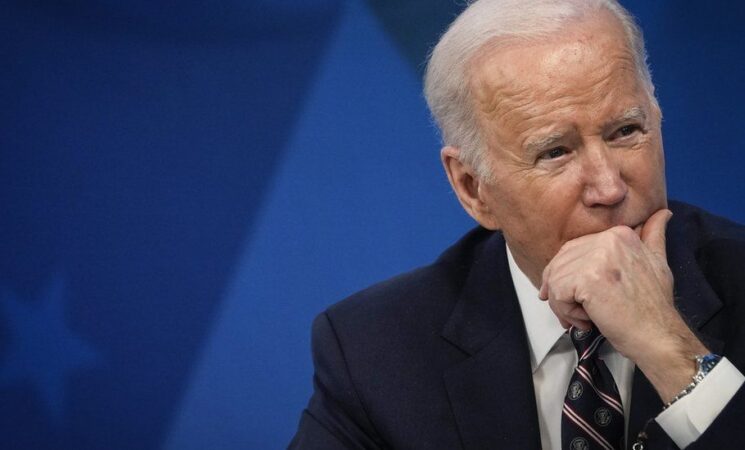10 June 2022, NIICE Commentary 8027
Tridivesh Singh Maini
A lot of commentators have repeatedly drawn attention to the multiple foreign policy challenges that the Biden Administration has been facing over the past year – while the first major foreign policy test for the Biden administration was the exit of US troops from Afghanistan, the Ukraine-Russia conflict has had even broader economic and geopolitical ramifications.
The US economy has, not unexpectedly, borne the brunt of the Ukraine-Russia crisis. A strong reiteration of this point is that consumer inflation hit a 40-year high in May 2022, increasing 8.6% from the previous year. According to US Labour Department data which came out on June 10, 2022, food and gas (gas prices had reached USD 4.99 a gallon last week) were major contributors to the steep rise in inflation. While in May 2022, energy costs rose 34.6% from a year earlier, groceries jumped 11.9% from last year.
The economic situation has dented US President Joe Biden’s popularity. In an ABC News/Ipsos poll published on June 4, 2022, only 28 percent of voters said they approved of the way Biden had handled the inflation problem, while 27 percent approved how he is tackling the increase in gas prices. According to the poll, a whopping 80% of voters said that inflation would influence their vote in the Midterms later this year.
During his visit to Los Angeles, last week, the President confessed the challenge posed by inflation but also pointed to the fact that unemployment had dropped to its lowest in 52 years.
Biden’s popularity has also dropped amongst democrat lawmakers, party members, and voters who believe he would be a liability for the Democrats were he to stand as President in 2024. Biden’s age has also been cited as a major drawback (in 2024, Biden will be 82). Democrat strategist David Axelrod in an interview with the New York Times stated: “The presidency is a monstrously taxing job, and the stark reality is the president would be closer to 90 than 80 at the end of a second term, and that would be a major issue.” He also said that Biden has not received credit for a number of his achievements because of his unconvincing body language.
Biden’s Foreign Policy So Far
Biden, an old foreign policy hand, while not deviating significantly from Donald Trump’s foreign policy on a number of issues – including ties with China – has tried to send out a message that he is less isolationist and is keen to work closely with allies – specially to counter China and Russia. Biden, has not been an idealist, though he has tried to bring the ‘moral dimension’ into his foreign policy. The US President has faced scathing criticism, from a number of quarters, especially for the US withdrawal from Afghanistan and his handling of the Ukraine crisis.
US Economy and Biden’s Foreign Policy
Given his low approval ratings and the mid-term elections in November 2022, Biden’s foreign policy will be driven by domestic politics – especially the state of the US economy.
If one were to look at the Biden Administration’s openness towards removing tariffs on certain Chinese products, such as household goods, and bicycles, imposed by former US President Donald Trump, it is driven by the urge to control inflation (tariffs on steel and aluminium are likely to remain in place).
US Commerce secretary, Gina Raimondo, while commenting on the same, said: “We are looking at it. In fact, the president has asked us on his team to analyse that. And so, we are in the process of doing that for him and he will have to make that decision.”
Biden also needs to keep oil prices down before the November mid-term election. His policy vis-à-vis the Middle East is important in this context. First, even if the Iran Nuclear deal 2015 cannot be revived, Biden will likely allow Iran to sell oil (ever since the Ukraine crisis, both Iran and Venezuela have been selling oil). Second, Saudi Arabia, which had earlier refused to drill more oil, has agreed to do so (Saudi Arabia-led OPEC and its allies agreed to a higher than expected increase in oil production), and Biden’s visit to Saudi Arabia in July is important in this context. While he had been scathing in his criticism of Saudi Arabia for its human rights record and had cold-shouldered Crown Prince Muhammad Bin Salman (MBS), who shared close relations with Biden’s predecessor, a reset of relations is likely during his visit. While commenting on his upcoming visit to Saudi Arabia, the US President said: “The commitments from the Saudis don’t relate to anything having to do with energy. It happens to be a larger meeting taking place in Saudi Arabia.”
In conclusion, the Biden administration faces numerous difficulties, and to address some of the economic challenges at home; he will need to tweak his foreign policy. It remains to be seen how political constituencies in the US respond to the lifting of tariffs on certain Chinese products and the outreach towards Saudi Arabia.

